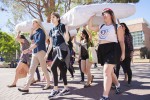Sexual assault survivors and advocates carried mattresses covered in the handwritten accounts of their experiences with gender-based violence in a student-led demonstration Wednesday.
The event was inspired by Emma Sulkowicz, a Columbia University student who lost her disciplinary case against the man she claimed raped her in a university dorm room two years ago.
As a symbol of protest after her request for an appeal was denied, Sulkowicz now carries the same-sized twin extra-long mattress that she was allegedly attacked on to and from class everyday. She said she will continue to do so until her alleged assailant is expelled. Columbia’s decision to refuse her appeal was final, according to the university’s bylaws.
The students who took part Wednesday in Carry That Weight, which was hosted by 7000 in Solidarity, said they gathered together to carry two mattresses across Bruin Walk and the Hill to share in bearing the emotional burdens they said have been caused by this type of violence.
“We want victims of sexual assault and intimate partner violence at UCLA to know that they are not alone and that we stand in solidarity with them,” said Undergraduate Students Association Council Student Wellness Commissioner Savannah Badalich.
According to the Centers for Disease Control and Prevention, one in four women and one in six men will experience sexual abuse before the age of 18. A 2012 CDC report said 19 percent of undergraduate women experienced sexual assault since entering college, though the report did not say how many men have.
“This isn’t just happening at Columbia, it’s happening here too,” Badalich said.
The event began at 11 a.m. and lasted for the next hour and a half. For the first 30 minutes, a group of about 35 students gathered to share stories at the Bruin Bear before collectively carrying the two mattresses up Bruin Walk and the Hill.
People who took part in the event were encouraged to write their experiences with sexual assault – their own or those of loved ones – onto the mattresses. However, organizers encouraged attendees to participate even if they had not experienced violence firsthand.
“People shouldn’t have to be victims in order to get involved, everyone is affected by sexual assault,” Badalich said.
Leaders of the Bruin Consent Coalition, which is the new name for 7000 in Solidarity, said they think sexual, gender and intimate partner violence influences more than just those who are directly harmed by it, and as a result, all students should take part in prevention efforts.
“At the end of the day, our goal is to have (awareness events) be led entirely by advocates because we don’t want more people to have to become survivors,” said co-director of the Bruin Consent Coalition Chrissy Keenan, a third-year human biology and society student. “We are trying to erase sexual assault and would love it if we were all advocates and allies.”
Keenan said one concern that arose when she helped plan the event was that the stigma surrounding sexual assault would keep students from publicly taking part, especially because some would be sharing their stories for the first time and others might be afraid to associate themselves with a campaign on a sensitive subject.
“I can completely understand why people wouldn’t want to publicly get involved, but this walk isn’t just for survivors, it’s for friends, advocates, and allies too,” Keenan said. “Sexual violence isn’t just the survivor’s problem, it’s the community’s problem.”
Sarah Whetzell, a third-year linguistics and psychology student, said she wanted to get involved with the mattress project because she hopes to increase dialogue on campus about sexual violence.
“I was motivated to participate because a lot of women suffer sexual abuse in the university setting, so it’s important that our school and our country emphasizes consent education,” Whetzell said.
Assistant director of 7000 in Solidarity and fourth-year global studies student, Farheen Jamil said she had hoped to see a better turnout.
“I’d like to see more people at these events because it’s not just a women’s issue or a gender issue, it could be you or someone you know. It takes acts of solidarity like this to end rape culture,” Jamil said.
She said that for those who have personally had to deal with the consequences of sexual violence, attendance at awareness rallies can be therapeutic.
“Taking part in these events is really empowering and makes people feel like they’re getting some control back,” Jamil said.

I’m all for awareness but 7000 in Solidarity is getting really old!. The student wellness commission is a one issue office and its’ very sad. Again, 7000 in solidarity is good for the campus BUT there other issues the commission should address as well, STD’s and homeless bruins would be a good start.
There are different subdivisions of USAC and of the student wellness commission focused on different aspects and issues. I recommend you bring up your ideas to one of the offices more closely related to those issues rather than just bash on this one which is trying to promote a positive message and space.